Irritable Bowel Syndrome isn't a disease you can cure with a pill or surgery. It’s a long-term condition that messes with your gut, your daily routine, and sometimes your entire life. If you’ve been dealing with bloating, cramps, diarrhea, or constipation that keeps coming back - and doctors keep saying there’s nothing "wrong" on the scans - you’re not alone. About 1 in 7 people worldwide have IBS, and most of them are women. It usually starts between ages 20 and 30, but it can hit at any age. The good news? You can get control over it. Not by hoping it goes away, but by understanding what’s happening, what makes it worse, and what actually helps.
What Does IBS Actually Feel Like?
IBS doesn’t show up on X-rays or blood tests. That’s why it’s called a "functional" disorder - your gut looks normal, but it doesn’t work right. The core symptom? Recurrent abdominal pain, happening at least once a week for three months or more. It usually gets worse after eating and improves after you go to the bathroom.
Most people with IBS experience one or more of these:
- Bloating - your belly feels tight, swollen, and uncomfortable, like you’ve eaten way too much
- Diarrhea - sudden urges, loose or watery stools, sometimes multiple times a day
- Constipation - straining, hard stools, feeling like you didn’t fully empty
- Mucus in stool - clear or white stringy bits, which can be alarming but aren’t dangerous
- Feeling like you still need to go - even right after a bowel movement
- Excess gas - frequent burping or flatulence that’s hard to control
There are three main types of IBS:
- IBS-D (diarrhea-predominant) - about 40% of cases
- IBS-C (constipation-predominant) - about 35%
- IBS-M (mixed) - about 25%, with both diarrhea and constipation switching off
It’s not just your gut. Around 70% of people with IBS also deal with other symptoms like acid reflux, nausea, early fullness when eating, chest pain that isn’t heart-related, or even a constant lump-in-the-throat feeling. These aren’t "in your head" - they’re real physical reactions tied to how your gut and brain communicate.
What Triggers IBS Flare-Ups?
IBS doesn’t flare up randomly. Something usually sets it off. And the triggers are different for everyone - but some patterns show up again and again.
Food is the biggest trigger. About 70% of people with IBS notice their symptoms get worse after eating certain things. The most common culprits are high-FODMAP foods - short-chain carbs that ferment in the gut and cause gas and bloating. These include:
- Onions, garlic, cauliflower, broccoli
- Wheat and rye products (bread, pasta)
- Dairy (milk, soft cheeses, ice cream)
- Artificial sweeteners like sorbitol and xylitol (found in sugar-free gum and diet sodas)
- Apples, pears, mangoes, watermelon
- Legumes like beans and lentils
Other common food triggers: caffeine (coffee, energy drinks), alcohol, spicy foods, and fatty meals. You don’t have to cut all of these out forever. The key is to figure out which ones affect you - and that’s where the low-FODMAP diet comes in.
Stress and emotions are just as powerful as food. Around 60-80% of people report worse symptoms during stressful times - exams, work deadlines, family arguments, even holidays. Your gut has its own nervous system, wired directly to your brain. When you’re anxious, your gut reacts. That’s why therapy can be as effective as medication for some people.
Hormones play a big role, especially in women. Around 60-70% of women with IBS say their symptoms flare up right before or during their period. Estrogen and progesterone levels affect gut motility, and when they drop, so does your gut’s stability.
Antibiotics can also trigger IBS. About 1 in 4 people develop symptoms after a course of antibiotics. That’s because they wipe out good bacteria in your gut, throwing off the balance. Sometimes, the symptoms stick around long after the infection is gone.
How Is IBS Diagnosed?
There’s no single test for IBS. Doctors diagnose it by ruling out other conditions and matching your symptoms to the Rome IV criteria. That means:
- Recurrent abdominal pain at least once a week for the last 3 months
- Pain linked to bowel movements - either improving or worsening after going
- Changes in stool frequency or form
But before they say "it’s IBS," they’ll check for red flags that mean something else could be going on:
- Onset of symptoms after age 50
- Unexplained weight loss
- Rectal bleeding
- Anemia (low iron)
- Family history of colon cancer or Crohn’s disease
- Diarrhea that wakes you up at night
If any of these are present, you’ll likely need tests: blood work, stool tests for inflammation or infection, a breath test for bacterial overgrowth, or a colonoscopy. For most people under 45 with no red flags, those tests aren’t needed - the diagnosis is based on symptoms alone.
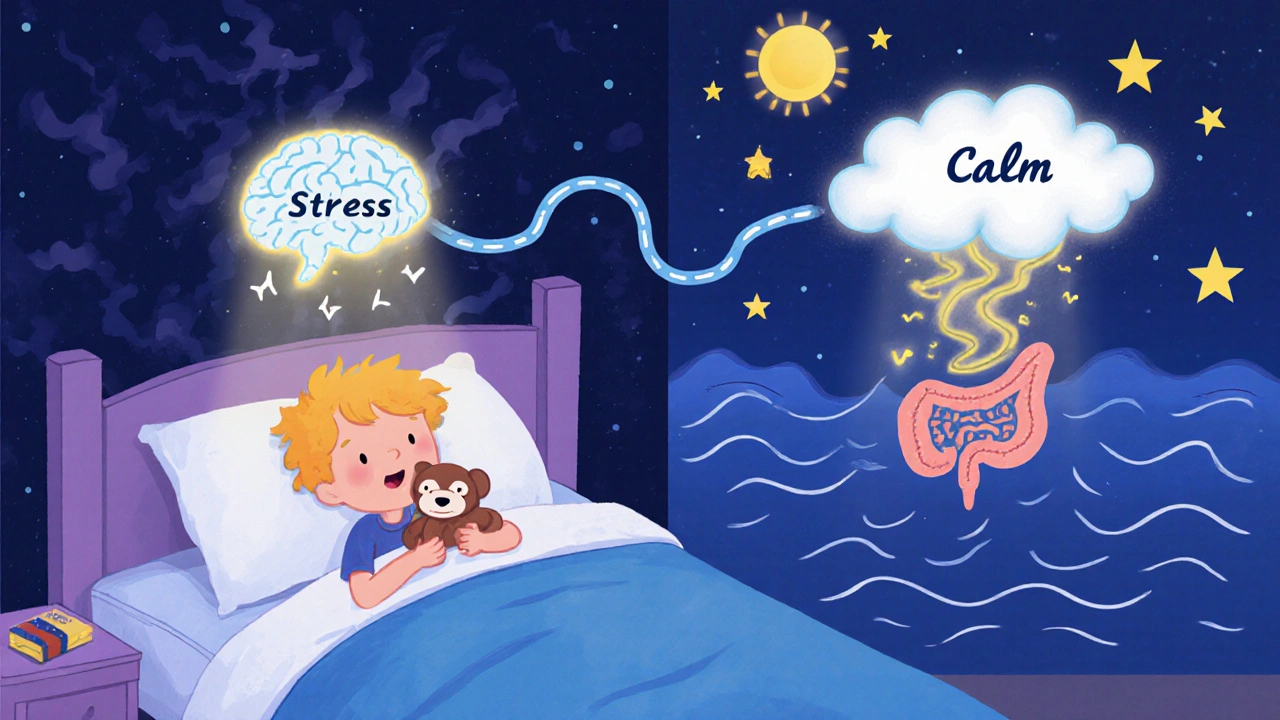
Medications That Actually Work
There’s no one-size-fits-all pill for IBS. Treatment depends on your subtype and what bothers you most.
For IBS-D (diarrhea):
- Loperamide (Imodium) - over-the-counter, helps slow diarrhea. Works for about 60% of people, but doesn’t touch the pain or bloating.
- Rifaximin (Xifaxan) - a non-absorbed antibiotic that targets gut bacteria. About 40-50% of people get relief from pain and diarrhea after a 14-day course.
- Eluxadoline (Viberzi) - works on gut nerves to reduce spasms and diarrhea. Also helps about half of users. Side effects can include constipation or pancreatitis in rare cases.
For IBS-C (constipation):
- Linaclotide (Linzess) - increases fluid in the intestines. About 30-40% of people have at least 3 full bowel movements a week after a few weeks.
- Plecanatide (Trulance) - similar to linaclotide, often better tolerated with fewer side effects.
- Lubiprostone (Amitiza) - pulls water into the gut to soften stool. Works for 25-30% of users.
For pain and overall symptoms:
- Antispasmodics - like dicyclomine (Bentyl) or hyoscine (Levsin). These relax gut muscles. About 55% of people report less cramping.
- Low-dose antidepressants - not for depression. Even at 10-30 mg of amitriptyline nightly, they help calm the gut-brain connection. About 40-50% of users see global improvement in pain, bloating, and bowel habits.
These meds don’t cure IBS. They manage it. And they take time - usually 2 to 8 weeks to notice real change.
What Else Works? Diet, Therapy, and Probiotics
Medication isn’t the only tool. In fact, for many people, non-drug approaches work better.
The low-FODMAP diet is the gold standard for food-based management. It’s not a lifelong restriction. It’s a three-step process:
- Elimination - cut all high-FODMAP foods for 2 to 6 weeks.
- Reintroduction - slowly add foods back one at a time to find your triggers. This takes 8 to 12 weeks.
- Personalization - keep what you tolerate, avoid what doesn’t.
Studies show 50-75% of people get significant relief with this approach - but only if they do it with a registered dietitian. Doing it alone often leads to unnecessary restrictions and nutrient gaps.
Gut-directed hypnotherapy and CBT are surprisingly effective. They don’t change your gut - they change how your brain responds to it. Clinical trials show 40-60% of people improve as much as with medication. Sessions are usually done online or in person over 6-12 weeks.
Probiotics are popular - but most don’t work. Only one strain, Bifidobacterium infantis 35624, has strong evidence. It improves bloating, pain, and bowel habits in about 35% of people - slightly better than placebo. Other probiotics? The data is weak.
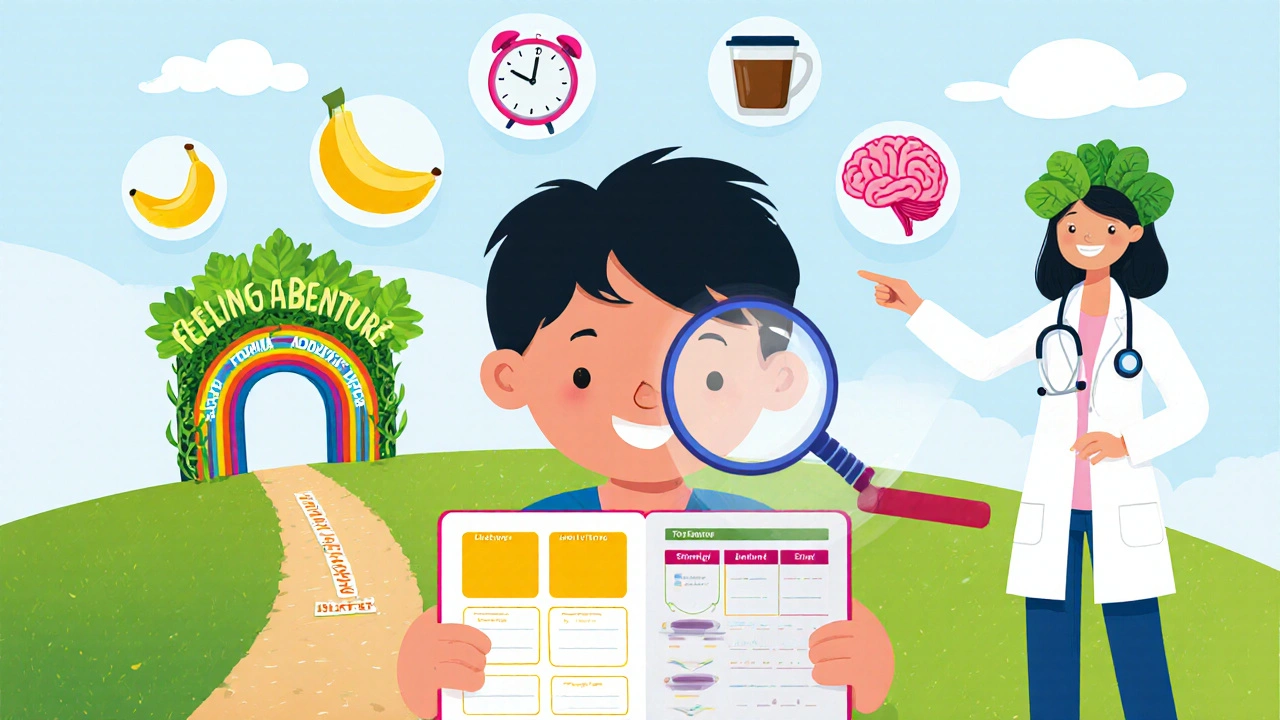
What to Expect in the Long Term
IBS doesn’t turn into cancer or IBD. It’s not life-threatening. But it can be life-disrupting. A 2022 survey of over 1,200 people found that nearly 7 out of 10 missed work or school because of symptoms - averaging more than 13 days a year. Many report waiting over 6 years to get a diagnosis, frustrated by doctors who dismiss their pain.
But the outlook is improving. People who combine dietary changes, stress management, and targeted meds see the best results. Around 60-70% of those who stick with a personalized plan report major symptom improvement within six months. That’s not a cure - but it’s enough to live well.
Research is moving fast. New drugs like ibodutant (a neurokinin blocker) are showing promise in trials. Fecal transplants are being tested to reset gut bacteria. But right now, the most powerful tools are still the ones you can start today: tracking your food and stress, talking to a dietitian, and finding the right treatment mix - not by trial and error, but by knowing what works for your type of IBS.
When to See a Doctor
If you’ve had unexplained gut symptoms for more than a few weeks - especially if they’re getting worse - don’t wait. See a doctor. Bring a symptom diary: what you ate, when you felt pain, your bowel habits, and anything stressful that happened. That’s the best way to get the right diagnosis and start feeling better.
Can IBS go away on its own?
IBS is a chronic condition, so it doesn’t usually disappear completely. But symptoms can go into remission for months or even years, especially with good management. Many people find that after identifying their triggers and adjusting their diet and stress levels, their symptoms become mild or infrequent enough to live without constant disruption.
Is IBS the same as IBD?
No. IBS (Irritable Bowel Syndrome) is a functional disorder - meaning the gut doesn’t work properly, but there’s no inflammation or damage. IBD (Inflammatory Bowel Disease), which includes Crohn’s disease and ulcerative colitis, involves actual inflammation, ulcers, and tissue damage visible on scans or biopsies. IBD can lead to serious complications; IBS does not.
Can stress cause IBS?
Stress doesn’t cause IBS, but it’s a major trigger. People with IBS have a more sensitive gut-brain connection. When stress hits, it sends signals that make the gut react more strongly - leading to cramps, diarrhea, or constipation. Managing stress doesn’t cure IBS, but it can reduce flare-ups significantly.
Are there any natural remedies for IBS?
Some natural approaches help, but not all are backed by science. Peppermint oil capsules have shown modest relief for bloating and pain in some studies. Ginger may help with nausea. But most herbal supplements - like turmeric or aloe vera - lack strong evidence. The most effective natural strategy is the low-FODMAP diet, done properly with professional guidance.
Can I drink alcohol with IBS?
Alcohol often makes IBS worse. It irritates the gut lining, speeds up digestion (leading to diarrhea), and can trigger bloating. Some people tolerate small amounts of low-FODMAP drinks like vodka or gin with soda water, but wine and beer - especially those with high sugar or gluten - are common triggers. If you notice symptoms after drinking, it’s best to avoid it.
How long does it take for IBS meds to work?
It varies. Loperamide works within hours. Rifaximin and antispasmodics usually show results in 1-2 weeks. Linaclotide and plecanatide may take 2-4 weeks. Low-dose antidepressants can take 4-8 weeks to reach full effect. Don’t give up too soon - consistency matters more than speed.
Can IBS affect my mental health?
Absolutely. Living with unpredictable pain, frequent bathroom trips, and social embarrassment can lead to anxiety, depression, or isolation. That’s not just "being dramatic" - it’s a real consequence of chronic illness. The good news? Treating the gut-brain connection with therapy or medication often improves both physical and emotional symptoms at the same time.
Next Steps for Managing IBS
Start simple. Keep a daily log for two weeks: what you eat, when you feel pain, your bowel habits, and your stress level. Look for patterns. Then talk to your doctor about the Rome IV criteria - ask if your symptoms fit. If you’re diagnosed, ask about a referral to a dietitian who specializes in IBS and the low-FODMAP diet. Don’t try to fix everything at once. Focus on one thing: maybe cutting out dairy for a week, or trying peppermint oil, or starting a mindfulness app for 10 minutes a day. Small changes add up. You don’t need to be perfect - just consistent. And you’re not alone in this.


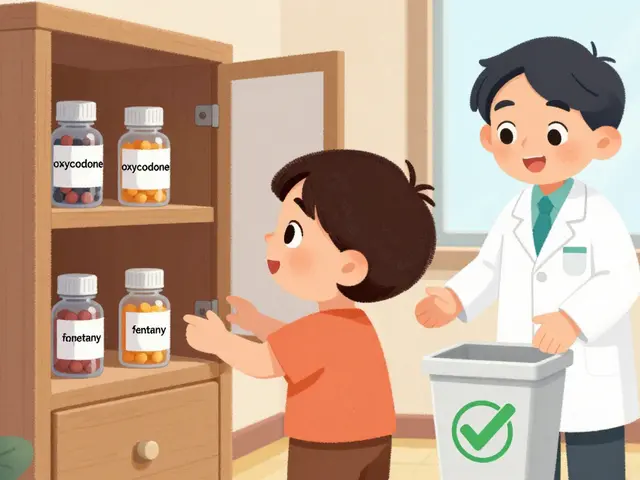
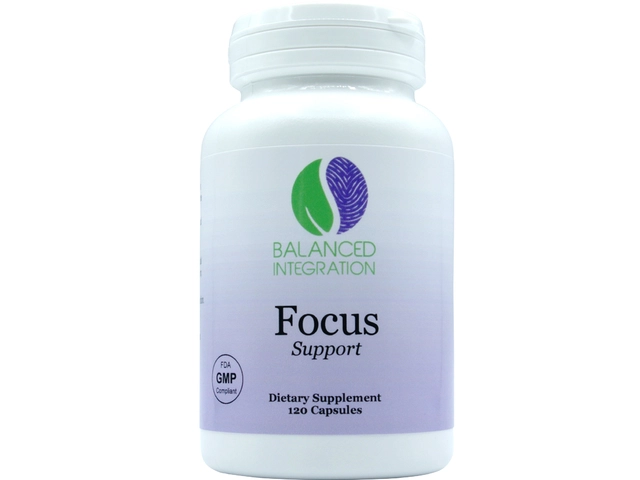
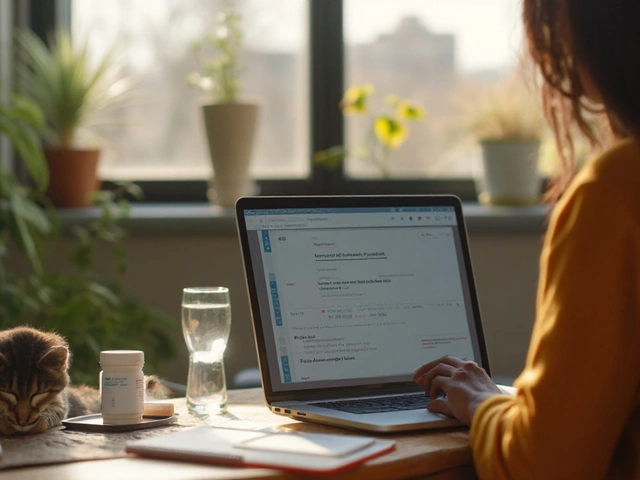
9 Comments
hannah mitchell
Been dealing with IBS for 8 years. The low-FODMAP diet changed everything - but only after I stopped trying to do it alone. Found a dietitian through my GI doc and she helped me figure out I can have garlic-infused oil but not actual garlic. Small wins matter.
Also, stress doesn’t make it worse - it makes it scream. Therapy wasn’t optional after a while.
vikas kumar
As someone from India where spicy food is basically life, I thought IBS was just "stomach weakness." Turns out it’s a whole system thing. Cut out dairy and onions - huge difference. Still have the occasional chai, but now I know why it hits different.
Also, probiotics? Only the one strain works. Everything else is just marketing.
Vanessa Carpenter
I love how this post breaks down the types. IBS-M is the worst - one day you’re constipated, the next you’re sprinting to the bathroom. No warning. No mercy.
And the fact that your gut has its own nervous system? Mind blown. No wonder antidepressants help. It’s not in your head - your head and gut are just too loud talking to each other.
Bea Rose
Antibiotics caused my IBS. 1 in 4. Not a coincidence. Not anecdotal. Data. Stop dismissing it.
Michael Collier
It is imperative to underscore the clinical validity of the Rome IV criteria in the diagnostic framework for functional gastrointestinal disorders. While symptom-based diagnosis may appear less definitive than imaging or laboratory confirmation, its empirical reliability has been validated across multiple international cohorts.
Furthermore, the integration of gut-directed hypnotherapy into mainstream gastroenterological practice represents a paradigm shift in patient-centered care, aligning with the biopsychosocial model of chronic illness management.
Shannon Amos
So let me get this straight… we’re supposed to believe that a pill made of poop (fecal transplant) is the future of medicine?
Meanwhile I’m over here eating kale and crying because my stomach hates me.
Also, why is everyone acting like peppermint oil is magic? I tried it. It tasted like minty regret.
stephen riyo
Hey, I just wanted to say… I had IBS for years, and I tried everything… I even did the low-FODMAP diet, but I didn’t stick with it because I was afraid I’d miss out on pizza… then I started taking magnesium… and I also stopped drinking coffee… and I started walking every day… and I tried a new probiotic… and I got a massage… and I started journaling… and I think it’s all of it together… but I’m still not sure… have you tried turmeric? I heard it helps… also, do you have a cat? My cat calms me down… I think animals help…
Wendy Edwards
Y’all need to stop acting like IBS is just "bad digestion." It’s not. It’s your body screaming because no one listens.
I waited 7 years to get diagnosed. My doctor said "maybe you’re just stressed." I WAS STRESSED BECAUSE I WAS IN PAIN AND NO ONE BELIEVED ME.
Now I take low-dose amitriptyline and I can actually leave the house. I’m not cured. I’m not fixed. But I’m not broken anymore.
And if you’re reading this and you’re still waiting for someone to believe you? I believe you. You’re not crazy. You’re not dramatic. You’re just sick.
And you deserve better.
Jaspreet Kaur
IBS is not a problem to be solved but a conversation to be had with your body
We treat the gut like a machine that broke down when really it’s a poet whispering in a language we stopped learning
Food triggers stress hormones hormones trigger gut spasms gut spasms trigger shame shame triggers more stress
It’s a circle not a chain
Maybe the cure isn’t in what we cut out but in what we finally allow ourselves to feel